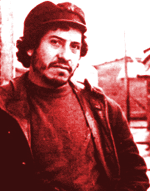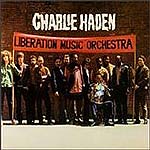What's the difference? Ten years. | |
 Victor Jara | Pre-Amble So we are all celebrating the return of the Go-Betweens? Same as it ever was and all that jazz, classical values upheld. Not sure if this misplaced romanticism is as offensive as the veiled misogyny which has seen Lindy Morrison written out of the Go-Betweens' story. You must not underestimate the contribution this great lady made. Anyway, if the Go-Betweens are maintaining tradition, this simply means that the new LP will be slightly less valuable than the last one which does not bode well. What's the difference? Ten years. Listening to Robert Wyatt's first solo outing The End of The Affair from 1970, it is interesting to muse on the ground he covered in the next ten years to the Nothing Can Stop Us compilation on Rough Trade. From playful outjazz excursions to songs of the masses transformed into personal protests and the very personal soul songs of the day transformed into defiant anthems. Nothing Can Stop Us is a compilation of singles Wyatt produced for Rough Trade at the start of the '80s, slightly pre-'Shipbuilding'. At one end of the spectrum you have 'The Red Flag' and 'Caimanera' sounding like vulnerable ballads aired to provide personal reaffirmation while the cover of the concurrent Chic ballad 'At Last I Am Free' takes on universal meaning, as does 'Strange Fruit', and therein lies the rub. Pop with meaning. One lovely song on this collection is 'Arauco', written by Violetta Parra. Until her sad death in 1967 Parra had been one of the leading lights in the Chilean folk song renewal movement, and had purposefully lived her lives among the peasants and the country's workers so she could absorb their culture and write a new style of folk song. She was a huge influence on Victor Jara, one of the leading folk singers who played such a huge part in the popular left (ah yes!) movement which would bring Allende to power before the military with its US support crushed the democratically elected government. In the process, Victor Jara was tragically murdered, bgut not before he wrote the first set of words for 'Venceremos', which Robert Wyatt would later sing. The moving story of Victor Jara is told in his wife's biography, but perhaps like me it was in the Clash's 'Washington Bullets' (from the grossly underrated Sandinista) that you first came across the name. For that was one of the endearing Clash traits - the persistent dot joining and name dropping. Just remember the amount of musical ground covered on old Sandinista and the groups they championed at that time (Bush Tetras, ESG, Grandmaster Flash, Creation Rebel etc.). Sandinista was also where I first heard the name Phil Ochs who at least in his time went down to Chile to show his support for the miners against the US funded clampdown. |

| In these strange days where the folk heroes are farmers and hauliers, it's reassuring almost to lose oneself in a Clash world of rebels and uprisings, and a thirst once again for information on Che and the Spanish Civil War and what really happened in Chile and what went wrong in Bolivia. It's hard to conceive that Brynle Williams and his popular front of farmers and truckers (rhyming slang surely?) will be immortalised in song that will reverberate down the years in the way the twenty minute suite of Spanish Civil War mass songs ignite on Charlie Haden's extraordinary Liberation Music Orchestra set. Featuring an all-star cast (this was in '69), including Don Cherry, Dewey Redman, Calrla Bley, Roswell Rudd and Andrew Cyrille, that suite is a cacophonic joy that captures the spirit of right minded (as in left minded, if you catch my drift) going to do their bit to defend the cause of freedom. As opposed to defending their right to buy an ever so slightly cheaper gallon of petrolÉ The real highlight of this set is Charlie's 'Song For Ché', and extraordinarily moving and dignified eulogy for the great Doctor which develops from sombre Spanish bass tones to free funereal squalls akin to those great Ayler religious ecstatic pieces. Appropriately, bringing us full circle, there is a condensed version of 'Song For Ché' on Robert Wyatt's Ruth Is Stranger Than Richard LP from 1975. Here, the tone is more subdued and restrained, making the song seem more like a sad, stately old time hymn. It's a nice way to end. © Kevin Pearce 2000 |